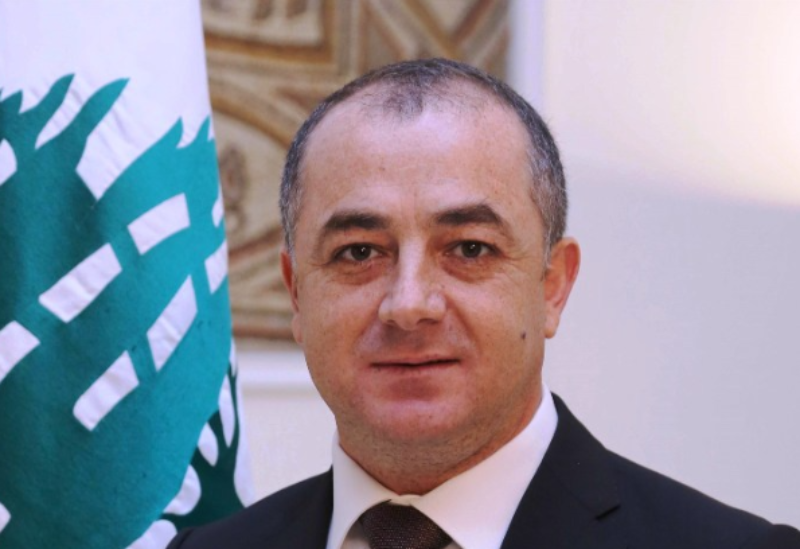
Deputy House Speaker Elias Bou Saab
Deputy Speaker of the House Elias Bou Saab, commissioned by the President of the Republic to administer the dossier of southern maritime border demarcation negotiations with Israel, revealed to “Al-Hurra” TV channel the expected date for the completion of the demarcation agreement and the mechanism by which the agreement will be signed.
He said: “The intelligence in this agreement stems from the understanding of the American mediator, Amos Hochstein, of the Lebanese situation and the inability to conclude an international treaty with Israel because it is an enemy state for Lebanon. Hochstein took this matter into consideration and found a creative way by concluding an agreement between America and both Israel and Lebanon that defines the points on which the consensus was reached. These are the points that the United States has included in a letter it will send to both Lebanon and Israel. Lebanon will respond by agreeing in writing to the content of the letter, and Israel will respond in the same way.”
Bou Saab continued to indicate that the letters may be delivered on the 26th or 27th of this month under the flag of the United Nations in Al-Naqoura.
Asked about who will be signing on Lebanon’s behalf, Bou Saab replied, “This decision is taken by the President of the Republic and he will choose the team that will head to Naqoura to present the letter.”
On the content of the call that US President Joe Biden held with President Michel Aoun, Bou Saab said, “It was an important and lengthy call in which the American president touched on the next stage and promised that the American side would be keen to ensure that the Israeli side respects the signed agreement.”
Bou Saab emphasized that “this agreement will open up for Lebanon a new horizon of foreign investments that create job opportunities for the Lebanese.”
“President Biden thanked President Aoun for his efforts, assuring him of his country’s support for Lebanon to ensure its transition to a new stage,” Bou Saab added, considering that “Biden’s words constitute a new openness to Lebanon.”
He continued, “It is true that the agreement is the basis, but there is something behind the agreement in terms of gas extraction and openness. We will see on Monday or Tuesday a statement from the Security Council welcoming what has been accomplished and stressing that it is an opportunity of hope for the Lebanese, their economy and their prosperity.”
Bou Saab commended “the priority that President Biden gave to this agreement and the great effort he made in this context,” adding that “history will record this achievement for him,” praising the negotiating method adopted by Amos Hochstein based on a ‘no winner-no loser’ principle, with focus on what each side can gain for the benefit of its country.
He considered that “the alternative to this agreement could have been war or escalation,” noting that “Netanyahu’s threat to cancel the agreement if he wins the elections is mere electoral talk, and that any breach of the agreement will be directed against the United States and its credibility before the world.
“The agreement also guarantees that there will be no provocation on the border, neither by Hezbollah or anyone else,” he maintained.
The Deputy House Speaker continued to disclose that following the President of the Republic’s announcement that Lebanon wishes to reconsider demarcation with Cyprus, a letter arrived to the Lebanese Foreign Minister from his Cypriot counterpart calling for the start of negotiations to amend the border with Cyprus. “The decision today rests with the President of the Republic, who decides how we can continue with Cyprus,” he said.
Bou Saab also called for “moving north as well to demarcate the border with Syria,” saying that “demarcation with Syria is less difficult, and we should start talking about this issue,” while urging some politicians in Lebanon to “put aside their differences with Syria and communicate with the Syrian leadership on the issues of the displaced and demarcation at sea, taking into account the economic interests of both countries.”
He added, “The demarcation agreement will facilitate the import of Egyptian gas and Jordanian electricity, and we are working on this issue with the same team in the US administration.”
Bou Saab went on to underline that the agreement is an achievement for Lebanon. “For years, we have been dreaming of Lebanon becoming an oil and gas-producing country. We must exploit this energy today. There is an international opportunity, especially in light of the crisis in Europe,” he emphasized, noting that “what has been achieved is an accomplishment for all the Lebanese, but we must not deny President Aoun’s insistence on bringing this file to its conclusions.”
Regarding the French role, Bou Saab said: “What concerns us today is to ensure that France stands by Lebanon to facilitate the work of ‘Total’ company and to speed up the start of operations and the extraction of gas,” stressing that Lebanon will not pay anything from its share in the Qana field to Israel, since what will be paid will be from Total’s share.
“Initial indications show that the Qana field is approximately equivalent to the Karish field in gas quantities, according to the preliminary studies of Total,” Bou Saab revealed, expecting that “the company will start exploration within months, and extraction may begin after four years.”
“However, before that, we can witness the return of investments and foreign companies, and this will facilitate Lebanon’s mission with the International Monetary Fund,” he explained.
Finally, Bou Saab reassured the Lebanese that “the international community will not accept tampering with the money that will later come to the sovereign fund,” asserting that “the eye of France, Europe, America and the whole world is on Lebanon in this regard.”